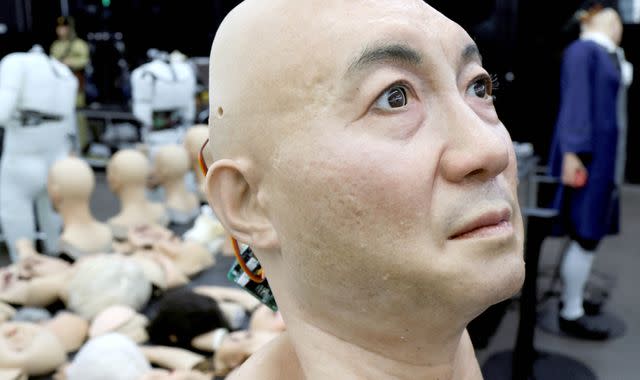Hyper-realistic humanoid robots could be used in psychotherapy

A factory in China is developing hyper-realistic humanoid robots that could be used in psychotherapy and counselling.
In the factory in China's northeastern coastal city of Dalian, neck-length silicone masks lie alongside silicone arms and feet, while disembodied heads sit on display and humanoid robots in various stages of construction stand nearby.
Drawings of robot designs adorn a wall.
Humanoid robots are the most complex type of robot to build and these ones use artificial intelligence to learn how to recognise human behaviour and mimic it.
"There are many basic models and algorithms that are commonly open source, which everyone uses," says Ex-Robot chief executive Li Boyang.
"However, we concentrate more on how to enable the AI to recognise and express expressions and emotions."
As an Ex-Robots worker moves her head, smiles and sticks out her tongue, a humanoid robot mimics her movement thanks to tiny motors installed in several spaces in its head.
"The model we're making is multi-modal and capable of emotional expression. It can perceive the surrounding environment and produce appropriate facial feedback," says Li.
Read more from Sky News:
23andMe investigated over data breach
Glowing dye helps find cancer cells
How the young are engaging with election
It takes from two weeks to a month to produce a humanoid robot, with prices ranging from 1.5 million yuan (£162,000) to 2 million yuan.
Li believes humanoid robots will be integrated into healthcare and education.
"Psychological counselling and health are certainly future application scenarios. We are currently conducting research such as auxiliary treatment and preliminary screening for emotional and psychological disorders," he says.
"Moreover, I believe that emotional interaction has broader applications in service fields, such as those aimed at children."

 Yahoo News
Yahoo News 
